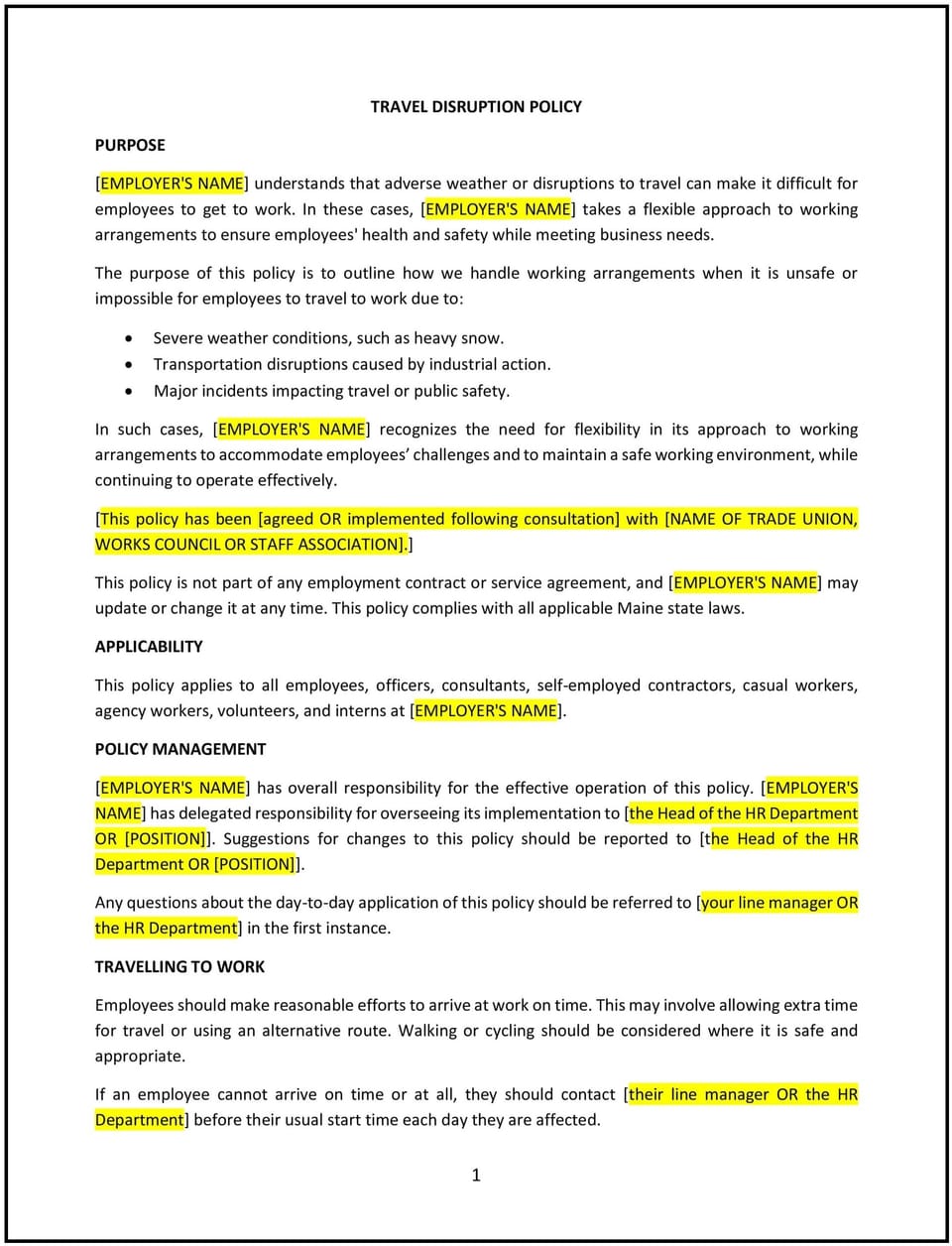Travel disruption policy (Maine): Free template

Travel disruption policy (Maine): Free template
This travel disruption policy is designed to help Maine businesses manage situations where employees experience travel disruptions due to factors such as canceled flights, severe weather, transportation strikes, or other unforeseen events. It provides guidelines for employees to follow in such situations and ensures the business’s operations are minimally impacted.
By implementing this policy, Maine businesses can support employees during travel disruptions while maintaining operational efficiency and minimizing potential costs or delays.
How to use this travel disruption policy (Maine)
- Define travel disruptions: Clearly define what constitutes a travel disruption, such as flight cancellations, delayed or missed connections, severe weather conditions, or transportation strikes that impact employee travel for business purposes.
- Set procedures for reporting disruptions: Require employees to report travel disruptions to their manager or HR as soon as possible, providing details about the situation and any expected delays.
- Provide support for affected employees: Establish guidelines for how the company will support employees during travel disruptions, such as rebooking flights, extending hotel stays, or covering meal expenses if necessary.
- Address communication protocols: Ensure employees maintain communication with their manager or HR to provide updates on the situation and make adjustments to work schedules or deadlines if required.
- Clarify responsibilities for expenses: Outline what expenses the company will cover during travel disruptions, such as additional transportation, lodging, or meals, and how employees should submit receipts for reimbursement.
- Set expectations for work continuity: Provide guidelines for maintaining work continuity during disruptions, such as remote work arrangements or adjusting deadlines to accommodate the situation.
- Review regularly: Update the policy periodically to reflect changes in business practices, employee needs, or travel-related challenges.
Benefits of using this travel disruption policy (Maine)
Implementing this policy provides several benefits for Maine businesses:
- Supports employees during disruptions: Ensures employees receive the support they need during travel disruptions, reducing stress and maintaining morale.
- Minimizes operational disruption: Helps businesses quickly adjust to travel disruptions by setting clear guidelines for handling such situations, ensuring business operations continue smoothly.
- Controls costs: Establishes clear reimbursement guidelines for expenses incurred due to travel disruptions, ensuring that costs are managed effectively.
- Improves communication: Ensures that employees report disruptions promptly and maintain communication, allowing businesses to adjust work schedules and expectations as needed.
- Enhances flexibility: Allows employees to manage unexpected disruptions without compromising work performance or company expectations.
Tips for using this travel disruption policy (Maine)
- Communicate the policy: Ensure all employees are aware of the travel disruption policy, including how to report disruptions and what support they can expect during travel-related issues.
- Establish a point of contact: Designate a manager or HR representative as the primary contact for employees experiencing travel disruptions, providing clear guidance and support.
- Monitor travel risks: Regularly assess potential travel disruptions based on common factors, such as weather patterns or seasonal delays, and prepare contingency plans.
- Be flexible with work schedules: Allow employees to work remotely or adjust deadlines if their travel disruption causes a delay in their arrival or ability to complete tasks.
- Review regularly: Update the policy as necessary to reflect changes in travel industry practices, company operations, or the nature of travel disruptions employees might face.
Q: What constitutes a travel disruption under this policy?
A: A travel disruption includes any event that prevents or delays an employee from traveling to a business-related destination on time, such as flight cancellations, transportation strikes, or severe weather conditions.
Q: How should employees report a travel disruption?
A: Employees should report travel disruptions to their manager or HR immediately, providing details of the situation and the expected impact on their travel and arrival time.
Q: What should employees do if they are unable to attend a meeting due to a travel disruption?
A: Employees should notify their manager or HR as soon as possible. If necessary, remote work arrangements can be made, or meetings may be rescheduled to accommodate the disruption.
Q: How often should businesses review their travel disruption policy?
A: Businesses should review the policy annually or whenever there are significant changes in travel conditions, business needs, or the travel industry that may affect employee travel.
This article contains general legal information and does not contain legal advice. Cobrief is not a law firm or a substitute for an attorney or law firm. The law is complex and changes often. For legal advice, please ask a lawyer.


